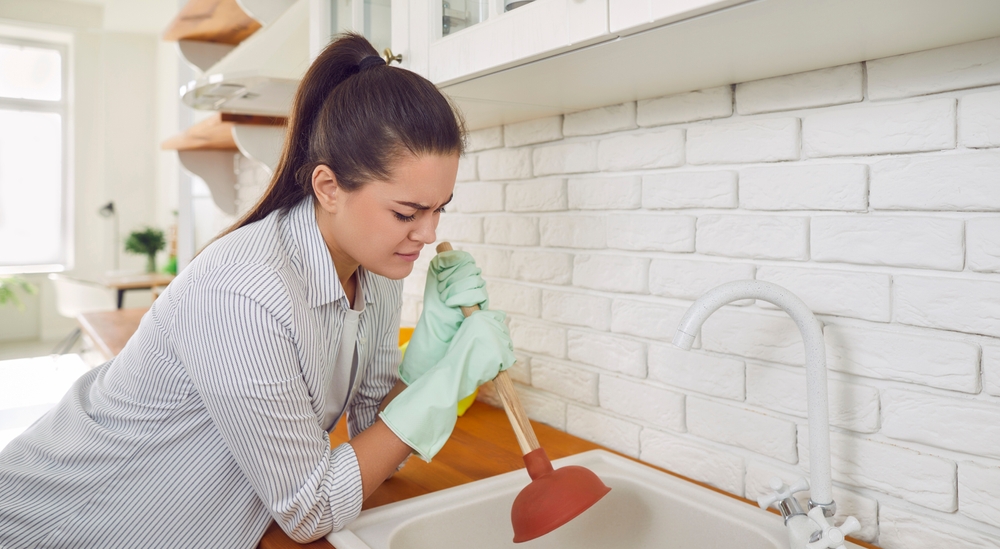Drain clogs are one of the main reasons homeowners find themselves urgently calling a plumber. And when the culprit is detected, many are surprised to learn how easily the problem could have been avoided in the first place. In fact, most clogs are the result of improper disposal habits or the neglect of routine maintenance. If you want to find out why you have to keep dealing with recurring clogs, check out the most common culprits behind the problem and how to correct the issue and avoid further plumbing problems in the future.
Hair: A Drain’s Favorite Saboteur
One of the most common causes of clogged drains in the bathtub and shower is — you guessed it — hair. It easily combines with soap scum and other residues to form dense, sticky blockages in pipes. While it may seem like just a few strands are going down the drain each day, there actually may be more of a problem than you realize. Over time, this buildup can significantly restrict water flow. And even if you take care of the problem with a plumbing snake, you will often have to deal with another clog sooner rather than later — unless you invest in a drain cover.
Grease and Oil: The Kitchen’s Worst Offenders
Does the following sound familiar? You’ve just finished a big, hearty breakfast and pour the leftover bacon grease down the sink. It disappears quickly, so you assume all is well. Unfortunately, grease and oil solidify as they cool and cling to the inside of your pipes. Not only does this create a blockage in and of itself, but it also traps food particles, making the problem ten times worse. Eventually, you’ll have such a severe clog that you will need to have it addressed by a professional plumber.
Food Scraps: Not All Leftovers Are Disposable
Do you scrape your plate directly into the sink, assuming your garbage disposal can handle it? This is a common habit that often contributes to why drains keep clogging. Fibrous foods like celery, potato peels, pasta, and coffee grounds don’t break down easily and can become lodged in your plumbing system, causing obstructions that grow over time.
Soap Scum: A Surprising Foe to Drains
While soap is essential for hygiene, it can also be an enemy to your plumbing. Traditional soap bars contain fats and oils that can accumulate within pipes, especially when combined with hard water minerals. This buildup contributes to slow drains and persistent blockages, especially in bathroom sinks and tubs.
Foreign Objects: The Result of Curious Kids and Careless Moments
Children love to explore, and sometimes that means flushing toys, wipes, diapers, or other foreign objects down the toilet. But even adults contribute to the problem by flushing paper towels, cotton swabs, feminine hygiene products, dental floss, and “flushable” wipes. The reality of the matter is that these items don’t break down like toilet paper and are among the top reasons your drain keeps clogging.
Tree Roots: Nature’s Weapon Against Plumbing
Not all drain clogs originate inside the house. If your home is older or surrounded by large trees, root intrusion could be the reason your drains frequently clog. Tree roots naturally seek out moisture and can infiltrate even the tiniest cracks in plumbing, eventually causing massive blockages that require professional intervention.
Hard Water Buildup: The Downside to Minerals
In areas with hard water, mineral deposits can accumulate along pipe walls, gradually narrowing the passage for water to flow through. This not only leads to clogged drains but can also damage appliances and fixtures. Installing a water softener may help alleviate this issue.
Poor Pipe Installation or Design: Problems From the Get-Go
Sometimes, the reason your drains keep clogging isn’t about what you’re putting down the drain at all. Poor pipe design, sharp bends, or incorrect slope can restrict water flow and contribute to frequent clogs. If your home frequently experiences drainage issues despite careful usage, an inspection might reveal a structural flaw in the plumbing system.
How Our Plumbers Resolve Recurring Drain Clogs
At Saffer Plumbing, we take a comprehensive approach to diagnosing and resolving clogged drains. Our licensed plumbers begin with a detailed inspection, often using video camera technology to pinpoint the exact location and cause of the blockage. Once identified, we employ a variety of techniques to clear the clog, including:
- Snaking or Augering: A flexible tool that dislodges and removes debris.
- Hydro-Jetting: High-pressure water is used to scour the inside of pipes, removing grease, soap scum, and even tree roots.
- Pipe Replacement: For severely damaged or improperly installed systems, replacing sections of pipe may be necessary.
We also provide guidance on how to prevent the most common types of drain clogs. In this way, families can go about their days without worrying about their plumbing throwing up a red flag.
Let Our Experts Clear Your Clogged Drains
It’s easy to assume that you can flush just about anything down the drain. After all, it’s a fast and seemingly harmless way to get rid of food scraps, cooking grease, excess paper products, and more. But this kind of thinking often leads to a variety of clogs that can wreak havoc on your plumbing system and end up costing you thousands of dollars in repairs.
If you’re experiencing persistent issues and can’t seem to get your plumbing to drain properly, don’t wait until the problem worsens. Call our expert team at Saffer Plumbing. Our drain cleaning professionals are ready to restore your plumbing system to peak condition and help you stop those pesky clogs once and for all.

